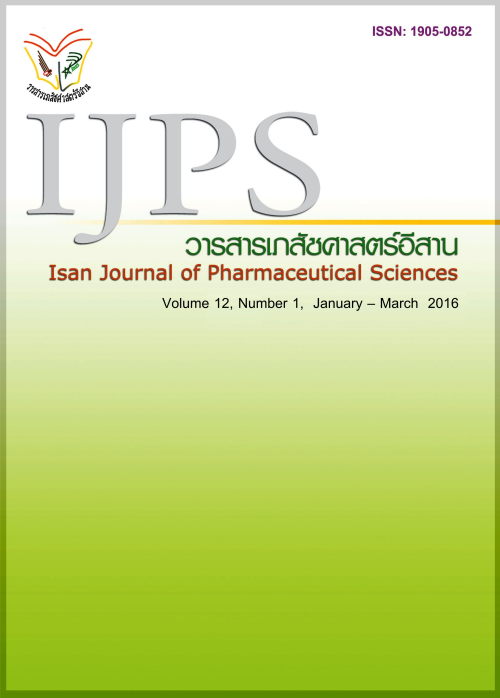Outcomes of the Collaborative Drug Therapy Management by Pharmacist in Caring Patients with Type 2 Diabetes at Banwiang Health Promoting Hospital, Phrae Province
Main Article Content
Abstract
Introduction: This study aimed to evaluate outcomes of type 2 diabetic patient care using Collaborative Drug Therapy Management (CDTM) by pharmacist. The CDTM was a process of health services with allows pharmacists to work under an authorization protocol by the physicians. Methods: This Quasi-experimental study was comparison outcomes of type 2 diabetic patient care using Collaborative Drug Therapy Management at Banwiang Health Promoting Hospital (CDTM group) with the usual care at Namlao Health Promoting Hospital (control group). The outcomes were clinical outcomes self-management knowledge self-management behavior and drug related problems. The study was conducted from September 2013 to March 2014. The patient participating till completion of the study were 80 of type 2 diabetic patients (40 patients in each group) with poor glycemic control (HbA1clevel ≥ 7%). Results: Patients in the CDTM group had significantly improvement in fasting plasma glucose level (p=0.049) than those in the control group. However, HbA1c level was not significantly different. Regarding self-management knowledge, the two groups were statistically different in disease, medication and exercise/health care (p=0.036, 0.015, 0.010 respectively) including self-management behavior in medication/treatment and exercise/health care (p=0.004, 0.026 respectively). In addition, the resolved of drug related problems in CDTM group was significantly greater than in the control group (p=0.002). Furthermore, the modification of medication in CDTM group was significantly greater than those in the control group (p=0.002). Conclusion: The results from this study indicated Type 2 diabetic patient care using CDTM by pharmacist improved the clinical outcomes self-management knowledge, self-management behavior and the resolve of drug related problem.
Article Details
In the case that some parts are used by others The author must Confirm that obtaining permission to use some of the original authors. And must attach evidence That the permission has been included
References
American Diabetes Association. Standards of Medical Care in Diabetes-2012. Diabetes Care 2012;35 (Suppl 1):S11-S63.
Bureau of Non Communicable Disease. Non communicable disease data. [online] [cited 2016 Feb 17]. Available from: www.thaincd.com/information-statistic/non-communicable-disease-data.php
Campbell RK. Role of the pharmacist in diabetes management. Am J Health Syst Pharm 2002; 59(9):18-21.
Choe HM, Mitrovich S, Dubay D, Hayward RA, Krein SL, Vijan S. Proactive case management of high-risk patients with type 2 diabetes mellitus by a clinical pharmacist: a randomized controlled trial. AJMC 2005; 11(4):253-60.
Collins C, Limone BL, Scholle JM, Coleman Cl. Effect of pharmacist intervention on glycemic control in diabetes. Diabetes Res Clin Prac 2011; 92:145-152.
Gilbert AL, Roughead EE, Beilby J, Mott K, Barratt JD. Collaborative medication management services: Improving patient care. Med J Aust 2002; 177:189-192.
Hammond RW, Schwartz AH, Campbell MJ, et al. ACCP position statement: Collaborative Drug Therapy Management by pharmacist-2003. Pharmacotherapy 2003; 23:1210-1225.
Hepler CD, Strand LM. Opportunities and responsibilities in pharmaceutical care. Am J Hosp Pharm 1990; 47:533-43.
Irons BK, Lenz RJ, Anderson SL, Wharton BL, Habeger B, Anderson HG Jr, et al. A retrospective Cohort Analysis of the Clinical Effectiveness of a Physician-Pharmacist Collaborative Drug Therapy Management Diabetes Clinic. Pharmacotherapy: The Journal of Human Pharmacology and Drug Therapy 2002; 22(10):1294-1300.
Isetts BJ, Brown LM, Schondelmeyer SW, Lenarz LA. Quality assessment of a collaborative approach for decreasing drug-related morbidity and achieving therapeutic goals. Arch Intern Med 2003; 163-1813-1820.
Jaber LA, Halapy H, Fernet M, Tummalapallis S, Diwakaran H. Evaluation of a pharmaceutical care model on diabetes management. Ann Pharmacother 1996; 30(3): 238-43.
Jameson JP, Baty PJ. Pharmacist collaboration management of poorly controlled diabetes mellitus: a randomized controlled trial. AJMC 2010; 16(4):250-5.
Khattab, M, Yousef, S, Khaderb, AA, Ajlounid, K. Factors associated with poor glycemic control among patients with type 2 diabetes. J Diabetes Complications 2008; 24: 84-89.
Leung, WY, So WY, Tong PC, Chan NN, ChanJC. Effects of structured care by pharmacist diabetes specialist team in patients with type 2 diabetic nephropathy. Am J Med 2005; 118(12):1414-27.
Munroe, WP, Kunz K, Dalmady-Israel C, Potter L, Schonfeld WH. Economic evaluation of pharmacist involvement in disease management in community pharmacy setting. Clin Ther 1997; 19:113-23.
Nathan, DM, Buse BJ, Davidson BM, et al. Medical management of hyperglycemia in type 2 diabetes: consensus algorithm for the initiation and adjustment of therapy: consensus statement of the American Diabetes Association and the European Association for the Study of Diabetes. Diabetes Care 2009; 32:193-203.
Pavasudthipaisit A, Awiphan R, Niwattananan K, et al. A randomized trial of a pharmacist practitioner model improve glycemic control in type 2 diabetic patient. TJHP 2011; 21(1): 9-23.
Pearson G, Yuksel N, Card D, et al. An Information paper on pharmacist prescribing within a health care facility. CJHP 2002; 55(1).
Petranuwat W. The benefit of group participation in the control and self-care of patients with non-insulin dependent diabetes mellitus. Journal of health systems research 2008 ; 2(1): 623-630.
Rothman RL, Malone R, Bryant B, et al. A randomized trial of a primary care-based disease management program to improve cardiovascular risk factors and glycated hemoglobin levels in patients with diabetes. Am J Med 2005; 118: 276-284.
Schumok TG, Butler GM, Meek DP, et al. Evidence of the economic benefit of clinical pharmacy services:1996-2000. Pharmacotherapy 2003; 23(1): 113-32.
Srichana W. Affecting factors on the control of fasting blood sugar level of type 2 diabetic patients attending diabetes mellitus clinic at Fang hospital,Chiang Mai province. [Master’s thesis].Chiang Mai: Chiang Mai University; 2005.
Volume CI, Farris KB, Kassam R, Cox CE, Cave A.Pharmaceutical care research and education project: Patient outcomes. J Am Pharm Assoc 2001; 41:411-420.
Wubben DP, Vivian EM. Effects of pharmacist outpatient interventions on adults with diabetes mellitus: systematic review. Pharmacotherapy: The Journal of Human Pharmacology and Drug Therapy 2008; 28(4):421-36.
Yoschamras S, Nippanan P. The effects of self-efficacy and goal setting to compare for blood sugar control behaviors of type 2 diabetes patients in chumphaehospital, chumphae district, khonkean province. KKU Journal for Public Health Research 2013; 6(3): 21-30.


